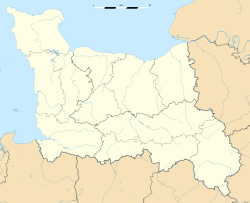Almenêches Abbey
You can help expand this article with text translated from the corresponding article in French. (April 2021) Click [show] for important translation instructions.
|
abbaye d'Almenêches | |
 Church of Almenêches Abbey | |
| Monastery information | |
|---|---|
| Order | Benedictine |
| Established | 6th century |
| Reestablished | c. 1063 |
| People | |
| Founder(s) | Roger of Montgomery |
| Architecture | |
| Heritage designation | Monument historique |
| Designated date | 1948 |
| Site | |
| Coordinates | 48°41′50.5″N 0°6′39.5″E / 48.697361°N 0.110972°E |
Almenêches Abbey (French: Abbaye d'Almenêches) was a Benedictine nunnery[1] at Almenêches in Orne, Normandy, France. It was founded in the 6th century, but had been abandoned by the 10th century.[2] Roger of Montgomery refounded it sometime between 1063 and 1066.[3]
History[edit]
During the Anglo-Norman civil war (1202–04), upon hearing the abbey was being used by Duke Robert Curthose as a stable,[3] Robert of Bellême burned it down.[4] The abbess, Bellême's sister Emma, fled with her sister nuns; they were temporarily accommodated in surrounding houses or at the Abbey of Saint-Evroul.[3] The following year Emma had the abbey at Almenêches rebuilt.[3] It subsequently suffered another fire under Abbess Matilda, Emma's successor,[3] and a third one after 1308.[2]
Episcopal visit[edit]
In 1260, Archbishop Eudes Rigaud noted the refectory was not in use; the nuns ate in groups of twos and threes in private rooms.[5] He ordered them to cease this activity and eat in the refectory.[5] Eudes also noted that the nuns ran up debts in the town and that some of the nuns even had children.[6] The nuns also failed to live a communal life, did not attend Matins or Compline, and allowed seculars to visit the nunnery.[6] Eudes admits to finding the nunnery in disarray, explaining he did not have the time to fix every problem he encountered.[7] Instead, Eudes ordered their bishop to instruct their abbess on the proper life for the nuns.[7]
Closure[edit]
In 1736, the community was transferred to Argentan Abbey.[2] During the French Revolution the Abbey church was then used to manufacture saltpeter.[8] Restoration of the church was carried out between 1864 and 1887 by architect Ruprich-Robert.[9]
In 1948 the church was listed as a Monument historique.[10]
References[edit]
- ^ Johnson 1991, p. 269.
- ^ a b c Hicks 2007, p. 193.
- ^ a b c d e Hicks 2007, p. 129.
- ^ Green 1999, p. 113.
- ^ a b Johnson 1991, p. 193-194.
- ^ a b Power 1922, p. 666.
- ^ a b Davis 2006, p. 53-54.
- ^ "Abbatiale Sainte-Opportune". Sauvegarde de l’Art Français.
- ^ "Eglise". www.pop.culture.gouv.fr.
- ^ "Eglise à Almenêches - PA00110713". monumentum.fr.
Sources[edit]
- Green, Judith A. (1999). Harper-Bill, Christopher (ed.). "Robert Curthose Reassessed". Anglo-Norman Studies XXII: Proceedings of the Battle Conference. The Boydell Press.
- Hicks, Leonie V. (2007). Religious Life in Normandy, 1050-1300: Space, Gender and Social Pressure. The Boydell Press.
- Johnson, Penelope D. (1991). Equal in Monastic Profession: Religious Women in Medieval France. University of Chicago Press.
- Power, Eileen (1922). Medieval English Nunneries, C. 1275 to 1535. Cambridge University Press.
- Davis, Adam Jeffrey (2006). The Holy Bureaucrat: Eudes Rigaud and Religious Reform in Thirteenth-century Normandy. Cornell University Press.53-54

